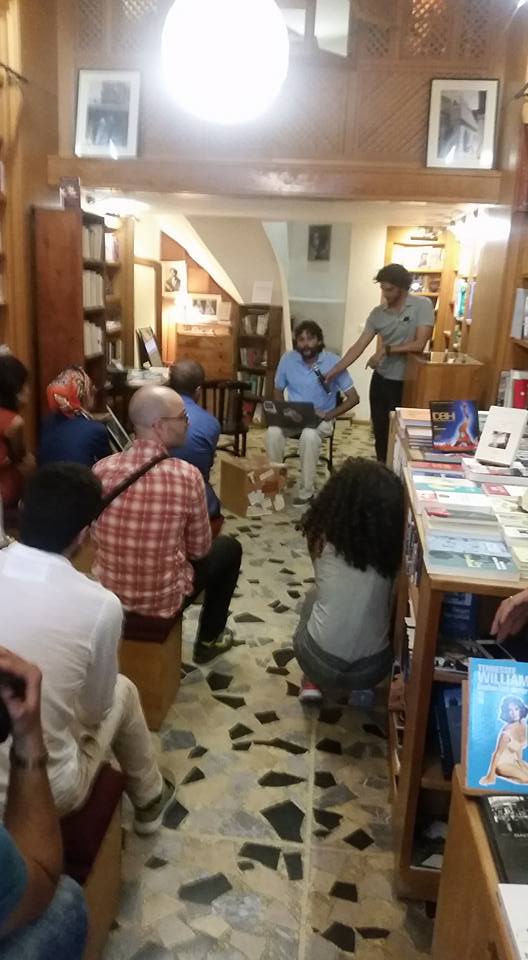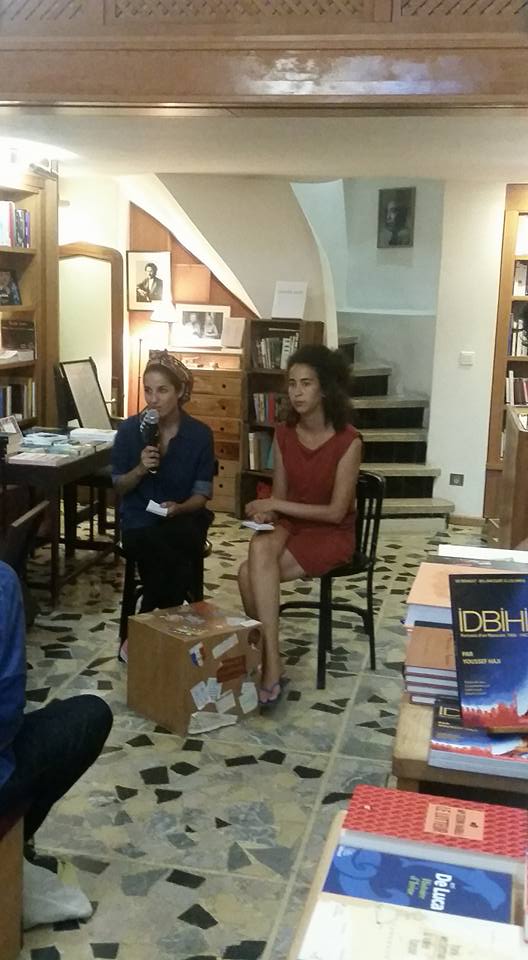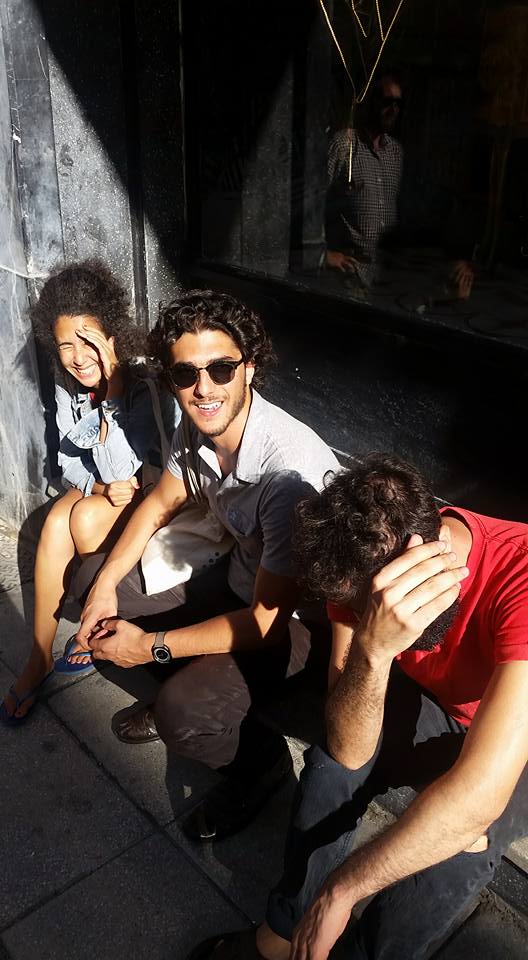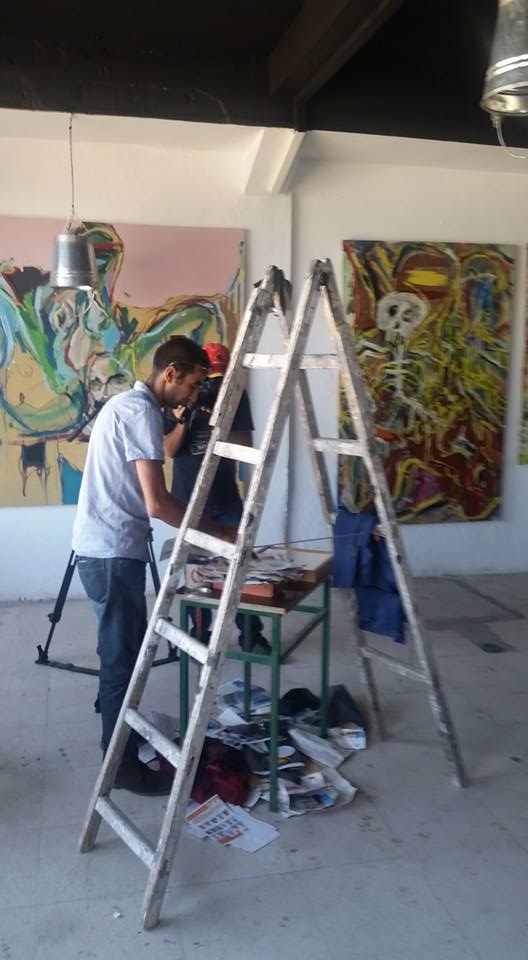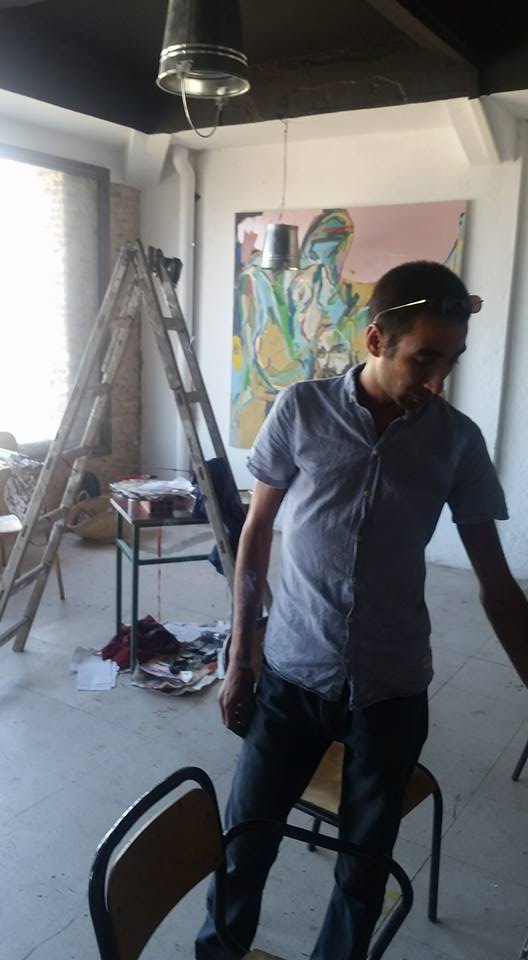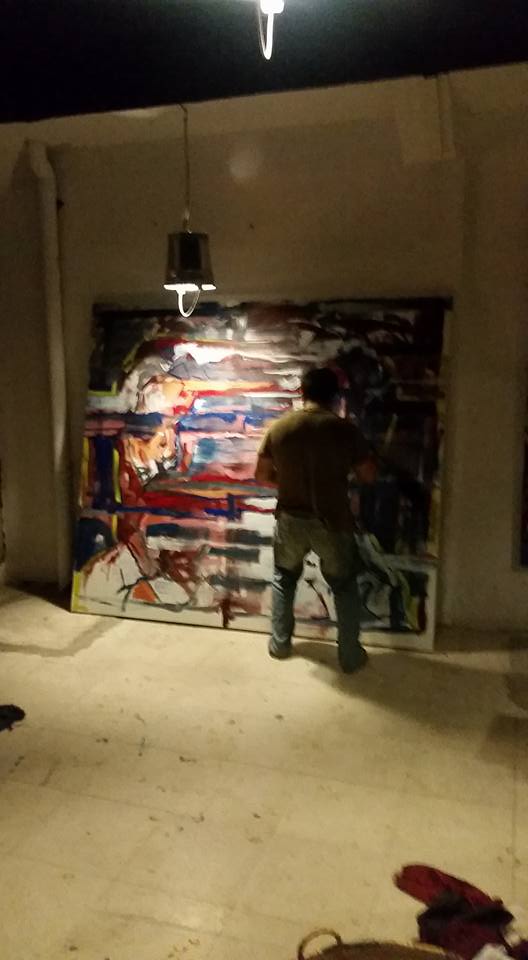More about the Youmein Festival
Youmein Creative Media Festival is a new festival conceived and produced by Borderline Theatre Project Founders George Bajalia and Tom Casserly and writer and cultural producer Zakaria Alilech.
2017 Edition: Imitation/ Tradition
2017 Invited Artists:
Nina Cholet & Boris Carré
Ahmed Benattia; Carlos Alcántar; Nadia El Kastawi
Loutfi Souidi
Adam Raougui
M'hammed Kilito
Oussama Tabti
Nassim Azarzar
Mehdi Djelil
Maya Benchikh El Fegoun
Ramia Beladel & Lena Krause (invited Youmein alumnae artists)
How do cultures change? Is a society made up of endless imitations that become canonized as tradition? Or do traditions change through borrowing from other cultures and societies? From the reiteration of simple zilij patterns which come together to form a more complex whole, to the inventive riffing on established forms in slam poetry and contemporary dance, imitation is often at the root of the most creative acts. In North and West Africa, Sufi scholars have long emphasized the memorization and imitation as the techniques of body which lead to an enlightened mind. In the late 19th century, French sociologist Gabriel Tarde proposed imitation, invention, and interference as the three principles which form the basis of cultural change. Rather than searching for an origin, or an authentic kernel from which these imitations draw, how do these processes of borrowing and imitating become new cultural forms? Is imitation simply blind appropriation, or does it form the basis of new traditions? North Africa, as both border and bridge between Africa and Europe, is home to a multitude of cultures which draw from one another, and from those across both continents. In this iteration of the YOUMEIN CREATIVE MEDIA FESTIVAL, we invite artists to reflect on “imitation” across languages, cultures, and borders in North and West Africa.
Youmein Creative Media Festival brings a group of artists together over the course of two days to develop diverse, new work centered on a common theme. Beginning with a series of workshops and panels, and culminating with a presentation of wholly original pieces created over a 48-hour period, this event will provide an outlet for young artists to develop and exhibit their craft. The proposed festival structure will gather a group of artists over the course of two days to develop new work in a variety of media centered on a common theme. Beginning with a series of public “open studios” and panel discussions at locations around Tangier, and culminating with a presentation of wholly original pieces created over the course of a 48-hour period, this event proposes an alternative narrative of borderland culture of the Tangier public sphere. This summer, from July 27-29, Borderline Theatre Project and the American Language Center of Tangier, in association with DABATEATR, will be hosting a 48-hour multimedium festival in Tangier. Produced in partnership with the Tangier-American Legation Institute for Maghreb Studies, and ThinkTanger, the festival will gather eight teams of artists specializing in a variety of media and art practices (theatre, music, film, visual art, and creative writing) to produce new work dealing with the theme of “Imitation” (تقليد .(Beginning with a series of public “open studios” and panel discussions at locations around Tangier, and culminating with a presentation of wholly original pieces created over the festival period.
In Arabic, the word imitation (تقليد (is used in plural (تقاليد (to designate tradition, but often in Morocco and other Arab countries, modernity is considered by some the imitation of a western way of life. We invite artists to reflect on the relationship between imitation and tradition, stasis and change, especially as relates to the movement across borders in North and West Africa. Tangier, and Morocco in general, is home to hybrid cultural forms that draw from Africa and Europe both. Yet, certain cultural practices, habits, or lifestyles are often labelled as simple imitation- of Middle Eastern, American, European, or African cultures . How does cultural borrowing and imitation break down borders, and how does it form new boundaries with little to do with national borders? Algorithmic code is at the core of contemporary culture, from the everyday use of electronic devices to data driven design. Though daunting, how different is this from Islamic geometric and astronomical sciences? How do techniques of copying and imitation enable innovation and invention? How do they limit them? What is the relationship between social movements, political change, and imitation? Social and political movements often occur across national borders, and the circulation of slogans, symbols, and demonstration practices involve definite forms of imitation. How do these slogans, symbols, and practices change as they spread? Is this a singular phenomenon, or wholly integral to broad social change in general?
2016 Edition: Crisis
2016 Invited Artists:
Adil Kourkouni
Flore Grassiot
Ismaîl Assalih
Lena Krause
Marie Gaidoz
Moad Mzaoeg
Mohammed Kannan
Nakata Betattabou
Noussayba Lahlou
Pierre Marchand
Said ElHaddaji
Wesal Yousef
Youssef Zaouii/ Marwan Youssef
The 21st century has been one of perpetual crisis. From food shortages and economic turmoil to failed
states and governmental policies, crises have governed the frame through which the past 16 years have
been narrated. In this iteration of the YOUMEIN CREATIVE MEDIA FESTIVAL, we invite artists to reflect
on the origins of this term, and its uses across different languages and cultures. The Romance genealogy
of “crisis” comes from the Greek krisis, or decision. A krisis could come at the end of a judicial trial, the
consequence of juridical deliberation, or could come at a turning point in a disease, when the future is
determined for better or for worse. In Arabic, ازمة) azma) denotes a similar meaning today, but comes
out of the root for to aggravate or to make decisive or critical. In newspapers and in scholarship, these
terms may be used interchangeably as translations for one another, but here we challenge our
collaborators to think about the space that exists between these translations, as well as their overlap.
Youmein Creative Media Festival brings a group of artists together over the course of two days
to develop diverse, new work centered on a common theme. Beginning with a series of workshops and
panels, and culminating with a presentation of wholly original pieces created over the course of a 48-
hour period, this event will provide an outlet for young artists to develop and exhibit their craft. The
proposed festival structure will gather a group of artists over the course of two days to develop new
work in a variety of media centered on a common theme. Beginning with a series of public “open
studios” and panel discussions at locations around Tangier, and culminating with a presentation of
wholly original pieces created over the course of a 48-hour period, this event proposes an alternative
narrative of borderlands and migration within the Tangier public sphere. In partnership with Arty Farty
Tanger’s Think Tanger project, the Tangier-American Legation Institute for Maghreb Studies, the
American Language Center-Tangier, and Border Art Factory, the festival will gather eight teams of artists
specializing in a variety of media and art practices (theatre, music, film, visual art, and creative writing)
to produce new work dealing with the theme of “Crisis” (or Azma /ازمة in Arabic). The festival will
conclude with a presentation of the eight pieces free of charge, and open to the public, resulting from collaborations between the artists throughout the course of the festival.
MORE ABOUT THE THEME
We invite artists to reflect on how media narratives create the idea of a crisis, and how
spectacles in the 24-hour news cycle impacts the individuals who live in the midst of a crisis themselves.
What does it mean to live in crisis? Today, is crisis a state of emergency, or a state of
exception? Or, perhaps to be in “crisis” has become the new normal.
How might a state of crisis be produced by media narratives, even in spite of feelings “on the
ground”?
Are the specters of climate change, national and extra-national war, and human mobility all
separate crises?
Are we at a turning point, or still approaching the turn?
If the world is in crisis toward what future is Tangier turning?
Like all cities, Tangier is host to crises that never make it into the news, neither in Tangier nor
abroad. In contrast to narratives of global proportion, crises most often play out in the minutia
of everyday life.
How might we refocus these larger global crises through the frame of a family crisis or
personal crisis? A family crisis or a domestic crisis can shatter our ideas of home, even if these
crises never become known outside of our own walls.
2015 Edition: Barzakh/Limbo
What does it mean to live in limbo? Most often we think of limbo as a temporary
state, somewhere in between heaven and hell, but what happens when it becomes
the normal state of affairs? How do borders (political, geographic, cultural) help to
create or maintain a state of limbo?
Limbo, is the state of “in between”—a realm of stasis and inaction, of waiting
without the knowledge of what, if anything, the future will bring. It is inextricably
tied to the creation of borders (geographic, political, cultural, metaphorical).
In the Bible, Limbo is the state of waiting for the Judgment Day—one foot in
Heaven, one foot in Hell, and both feet not quite anywhere at all. Similarly, in Islamic
eschatology, al-Barzakh is the separation between the physical and spiritual worlds,
where a soul is freed from the body, but unable to utilize action—it is here where
the soul waits, contemplates, and prepares for al-Qiyamah.
But this state isn’t limited to the theoretical...the idea of al-Barzakh flows through life
in North Africa, from the simple act of staring across the Strait of Gibraltar to a
nearby (but unreachable) Spain, to the more mundane (but all too real) bureaucracy
in everyday life that threatens to destroy citizens’ ability to take action, leaving them
to await judgment that may or may not come.
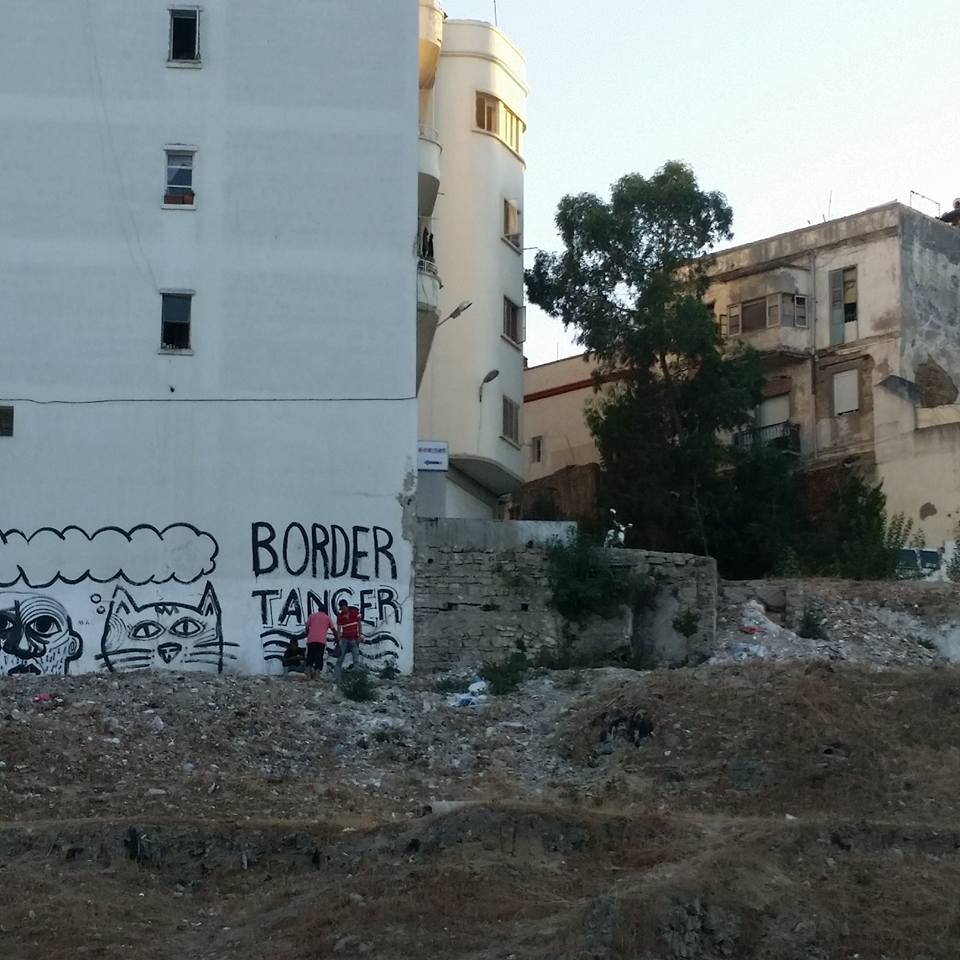
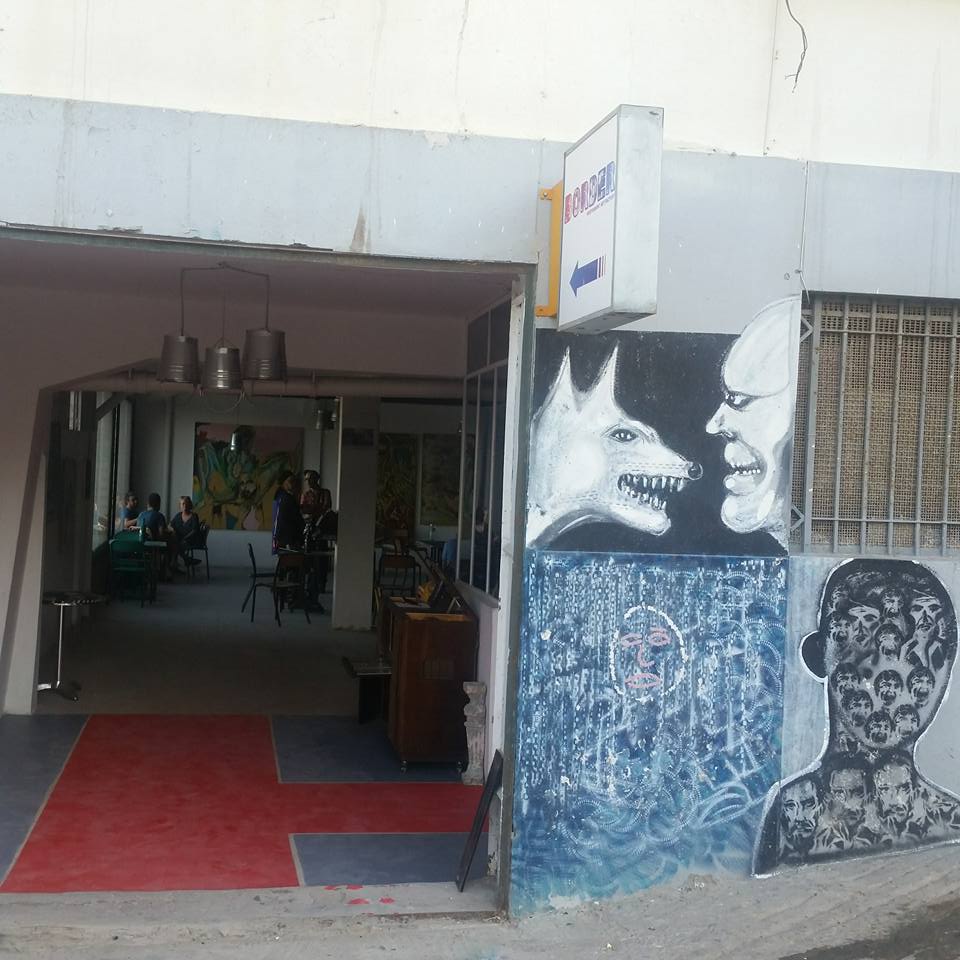


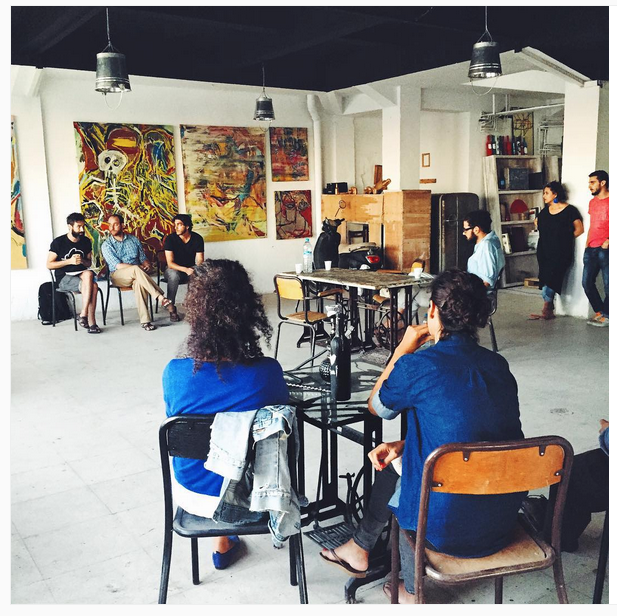
The festival took place in a variety of locations across Tangier, Morocco. Border Indepedent Art Factory, The Tangier-American Legation Institute for Moroccan Studies, the Librairie des Colonnes, and Kind of Blue Art Gallery, all hosted events for the festival.
Press coverage:
Moroccan national television channel 2M featuring Youmein- Tangier (from 18:20 on).


